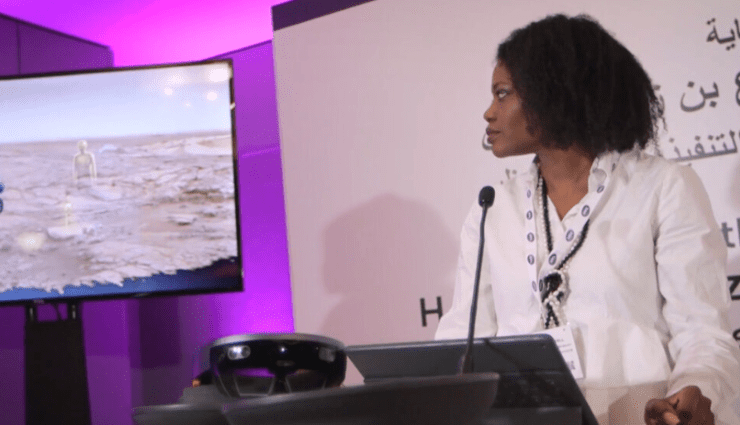11/01/2022 by Carney Sandoe Staff |
10 Questions with Dr. Marsha Maxwell

Marsha Maxwell is the Head of Technology and Innovation at Atlanta International School (AIS), in Atlanta, Georgia. Prior to joining AIS, Marsha worked at schools in Korea and Turkey teaching English language and literature and working with teachers in technology for almost two decades. She is interested in experiential learning, innovation, and addressing challenges head-on. As a leader, she is “out front,” a continual learner, and a risk-taker.
1. What is the core of your current job, on a day-to-day basis?
There is no typical day-to-day in my current job. Under my umbrella, I work on everything that involves technology or computer science at AIS. In the category of operations, I am responsible for the student information system and cyber-security. I supervise the STEAM innovation and entrepreneurship program and lead the library team. Separate from operations, I am heavily involved in creating the school’s vision and strategic planning. My role encompasses the whole school – academic, operational, and strategic.
2. What’s next in education, from your standpoint?
Immersive technologies (VR and AR) are next in education for both experiences and learning. Thanks to the pandemic we should see things start “heating up” in that area, and I am researching how to enhance and protect student well-being, as it does.
3. What are some examples of immersive technologies in the classroom?
One example of an enhanced learning experience using immersive technology is using virtual reality to teach an anatomy lesson, going layer by layer through the body. Another example would be designing spaces and having virtual walk-throughs with other people, allowing the designer to get critical feedback before an actual build. Immersive technologies are a powerful tool and are very forgiving when learners make mistakes.
4. What was your first job in education? What are the major steps you’ve taken since then?
My first job in education was as a literature teacher. All my degrees were in science and technology, but I received my teaching degree to teach language and literature in Korea. I also taught the teachers how to teach using technology. Thereafter, I worked in Turkey at various private and international schools teaching English language and literature before moving in science and technology. I have taught every single grade from pre-K to graduate school classes. Teaching different subjects and grade levels allows me to understand what teaching strategies really work across the board.
5. What prompted your interest in education and/or your interest in leadership?
I have always taught something. I was always the tutor or the TA in school. Everyone told me that I should teach, but I went to a startup and worked in marketing. When I decided to leave the business world, I wanted to switch to something that would matter in the long run. Now when someone asks me what I do, I feel better saying that I’m in education.
As a leader, I don’t accept the status quo. I want to make things better and look for efficiency. If I see a problem, I try to fix it. I’m always looking out for how to improve and how to innovate.
6. What is something you learned about yourself through your current role and/or the leadership positions you have held?
In my current role, I learned that I like challenges, and I’ve learned to address challenges head-on. I’ve also learned resilience. A lot has happened in in our world in the last few years, and holding a team together through of if it has been challenging – but in a good way. I’ve been able to home in on the type of leader I want to be. I’ve really gained confidence.
7. Where do you look for inspiration, support, and advice? Perhaps a specific person, group of people, author, thought leader, or community?
I look for inspiration in science fiction books where people are talking about dreaming and what humanity could be. The artists and dreamers are pushing humanity forward. I also look to the past to see where people are coming from.
8. What is the best career advice you have received? From whom?
It’s not necessarily career advice, but my undergraduate advisor said, “I know you don’t like to do homework, but you have to do homework.” For me, that means do the things you have to do, because you don’t know how it may set you up for opportunities in the future. Go through the boring to get to the sublime.
9. On your best days at work, what are you doing? What aspects of your job bring your particular joy?
On my best day at work, I have a nice mix of time to think and work through intellectual problems and new way of doing things. I have conversations with colleagues about how to implement programming. I spend time with students to see what they are thinking about and guide them in conversation about the work they are doing.
10. What advice would you share with those people aspiring to leadership? What advice would you give your younger self?
Be yourself. People may not see people who look like them in leadership positions. If you are the real you, then you are always being authentic and not having a facade. It creates better relationships, develops trust from the team, and creates happiness on your end.
11. Tell us about an item in your bag, in your office, or on your kitchen counter that captures the essence of who you are.
I have a well-made mechanical pencil that took me hours to find. I like pencils and writing, so I always keep pencils or notebook in my bag to write down ideas and sketches. I think that speaks to spontaneity and preparedness.
Leave a Comment
0 Comments
There are no comments on this blog entry.